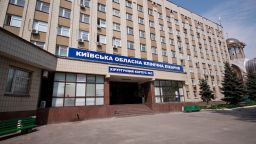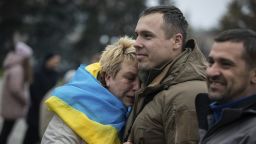The mayor of Kyiv has said the city “cannot let Putin steal our Christmas” as Ukrainians prepare to tentatively celebrate the festive season with darkened trees while Russian airstrikes knock out power and wreak havoc on critical infrastructure.
Christmas trees will be erected across the Ukrainian capital to mark Christmas and the New Year, Kyiv’s mayor Vitaly Klitschko told Ukrainian news outlet RBC-Ukraine, but energy company YASNO said they will not be illuminated.
Mass events will remain prohibited under martial law, but “no one is going to cancel the New Year and Christmas, and there should be an atmosphere of the New Year,” Klitschko told the network. “We cannot let Putin steal our Christmas.”
His call comes after weeks of sustained aerial attacks on Ukraine’s energy grid, which have left families across the country without electricity, light or water intermittently.
Officials are racing to restore resources quicker than Russia can knock them out. Ukraine’s electricity operator Ukrenergo said Tuesday that it was running at a 30% deficit, 3% higher than the day before, after it had implemented a series of “emergency shutdowns” across the country at “several power plants.”
Kyiv’s Christmas trees will provide a nod to normality in sites across the city, including the famous Sophia Square. Klitschko said they will be installed “to remind our children of the New Year mood.”
“You know, we do not want to take away St. Nicholas from children,” he said.
But YASNO has clarified that the trees would erected but without lights. In a short statement on Facebook the company said: “We do not know how about you, but we are glad that there will be [trees] and a decision on the absence of illumination on them.”
YASNO cited the load a full illumination would place on the Ukrainian grid, saying it will “reduce a significant additional load on the grid. And, consequently, reduce the number of blackouts.”
Given deteriorating weather conditions, power usage is on the rise, Ukrenergo said, saying that it hoped the power deficit would reduce as “units return to operation.” Seven waves of Russian missiles contributed to the latest round of outages, it claimed. CNN is unable to independently verify the number of missile waves.
But the race to plug gaps in the power grid is likely to be a recurrent theme as Ukrainians brace for a cold and dark winter. As recently as Sunday, Kyiv had “almost completely restored” its power, water, heat, internet and network coverage, the Kyiv city military administration said at the time.
‘Don’t forget about our tragedy’
Speaking ahead of a NATO foreign ministers’ meeting in Bucharest, the chief of the military alliance said Russian President Vladimir Putin was “trying to use winter as a weapon of war.”
NATO allies have delivered generators to help Ukraine restore its collapsed energy infrastructure, Jens Stoltenberg said, but he added he expected the message from the foreign ministers to be that allies “need to do more,” including providing Ukraine with more air defense systems and ammunition.
And Ukrainian first lady Olena Zelenska has urged the international community to remain focused on the conflict as the festive season approaches.
“We do hope that the approaching season of Christmas doesn’t make you forget about our tragedy and get used to our suffering,” she said in a BBC radio interview on Tuesday, while on a visit to London.
“I realize that nine months is a very long time, and Ukrainians are very tired of this war, but we have no choice in the matter. We are fighting for our lives. The British public do have a choice: They can get used to our tragedy and concentrate on their own important things in life,” she said.
Ukraine’s President Volodymyr Zelensky has meanwhile appealed to local authorities, including in Kyiv, to do more to build-out his government’s “invincibility points” – pop-up stations offering shelter and services, such as power charging facilities, internet connections, and hot water.
Zelensky criticized the program’s rollout, especially in the capital where he said only some sites were working properly. “Other points still need to be improved, to put it mildly,” he said. “Kyiv residents need more protection.”
And the Kyiv Regional Clinical Hospital, one of Ukraine’s largest hospitals, was last week on the verge of moving patients undergoing dialysis treatment, which requires an uninterrupted water supply, Vitaliy Vlasiuk, the deputy head of Kyiv region military administration, said in a telephone interview.
“Unfortunately when the power goes off in Kyiv, the central water supply also often fails,” Vlasiuk said. “A lack of water supply is critical.”
Meanwhile, the United Nations has said that the situation in the southern Ukrainian cities of Mykolaiv and Kherson remains “dire” and “critical.” Nearly a quarter of a million people in Mykolaiv alone face a lack of heat, water and power.
Olga Voitovych reported from Kyiv and Rob Picheta wrote from London. Kostan Nechyporenko, Andrew Carey, Maria Kostenko and Yulia Kesaieva contributed to this report.


